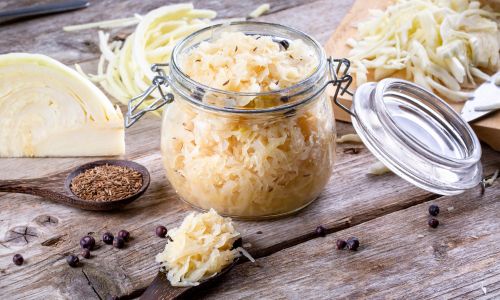Sauerkraut, a tangy and crunchy fermented cabbage dish, has been a staple in Central European cuisine for centuries. Not only does it tantalize the taste buds, but it also offers a plethora of health benefits. In this comprehensive guide, we’ll delve into the nuances of sauerkraut, from its origins to its nutritional content, and explore why it’s revered for gut health. We’ll also address the debate between store-bought and homemade varieties, offer case studies, and provide tips on consumption. So, let’s dive in!
What is Sauerkraut?
Sauerkraut is a traditional fermented cabbage dish originating from Central and Eastern European cuisines. Made through lacto-fermentation, shredded cabbage is mixed with salt and left to ferment, promoting the growth of beneficial bacteria like Lactobacillus. This process yields its distinctive sour flavor and crisp texture. Sauerkraut is not only a culinary delight but also offers numerous health benefits. It’s rich in fiber, vitamins C and K, and antioxidants, supporting digestive health and immune function. With its probiotic properties, sauerkraut aids in maintaining a healthy gut microbiome. Its versatility makes it a popular addition to various dishes, adding both flavor and nutritional value to meals.

Store-bought vs. Homemade Sauerkraut
When it comes to sauerkraut, both store-bought and homemade varieties have their merits, but they differ significantly in terms of flavor, texture, and nutritional content.
Store-Bought Sauerkraut:
Store-bought sauerkraut offers convenience and consistency. It is readily available in most grocery stores and comes in a variety of brands and packaging options. However, many store-bought varieties are pasteurized or heat-treated to prolong shelf life, which can kill beneficial bacteria and diminish probiotic content.
Additionally, store-bought sauerkraut may contain additives, preservatives, or excessive amounts of salt to enhance flavor and extend shelf life.
Homemade Sauerkraut:
Homemade sauerkraut allows for greater control over the fermentation process and ingredient quality. It typically involves shredding fresh cabbage, mixing it with salt, and allowing it to ferment naturally in a sealed container. This fermentation process preserves the cabbage while promoting the growth of beneficial bacteria.
As a result, homemade sauerkraut tends to have a more vibrant flavor, crunchier texture, and higher probiotic content compared to store-bought varieties. Plus, you can customize homemade sauerkraut with additional ingredients like carrots, apples, or spices to suit your taste preferences.
Why Eat Sauerkraut for Gut Health?
Eating sauerkraut promotes gut health due to its rich probiotic content. The fermentation process creates beneficial bacteria that aid digestion, support a healthy gut microbiome, and may improve immune function. This makes sauerkraut an excellent choice for maintaining overall digestive wellness and enhancing nutrient absorption.
Nutritional Content of Sauerkraut
Sauerkraut is not just a tasty addition to meals; it’s also packed with nutrients that offer numerous health benefits. Here’s a breakdown of the nutritional content of sauerkraut per one-cup serving (approximately 142 grams):
- Calories: Sauerkraut is relatively low in calories, with approximately 27 calories per one-cup serving.
- Carbohydrates: Sauerkraut contains about 6 grams of carbohydrates per serving, making it a suitable option for those watching their carb intake.
- Fiber: One cup of sauerkraut provides approximately 4 grams of dietary fiber. Fiber is essential for digestive health, promoting regularity and aiding in the prevention of constipation.
- Protein: Sauerkraut contains a small amount of protein, with around 1 gram per serving.
- Fat: Sauerkraut is virtually fat-free, with minimal fat content per serving.
- Vitamins: Sauerkraut is a good source of vitamins, particularly vitamin C and vitamin K. One cup of sauerkraut can provide over 35% of the recommended daily intake of vitamin C, which is essential for immune function and skin health. Additionally, sauerkraut is rich in vitamin K, which plays a crucial role in blood clotting and bone health.
- Minerals: Sauerkraut contains various minerals, including calcium, potassium, and magnesium. These minerals are essential for maintaining bone health, muscle function, and electrolyte balance.
- Probiotics: Perhaps one of the most significant nutritional benefits of sauerkraut is its probiotic content. During the fermentation process, beneficial bacteria, such as Lactobacillus species, proliferate, leading to the formation of probiotics. These probiotics promote a healthy balance of gut bacteria, supporting digestion, immune function, and overall gut health.
- Antioxidants: Sauerkraut contains antioxidants, such as flavonoids and phenolic compounds, which help neutralize harmful free radicals in the body and reduce inflammation.
Case Studies
Case Study 1: Gut Microbiome Diversity Improvement
In a study published in the Journal of Applied Microbiology, participants were instructed to consume a daily serving of sauerkraut for six weeks.
Researchers observed a significant increase in the diversity of gut bacteria among participants. This increase in microbial diversity is associated with improved digestion, reduced inflammation, and enhanced immune function. The findings highlight the potential of sauerkraut as a dietary intervention for promoting gut health.
Case Study 2: Reduction of Digestive Discomfort
In another study conducted by the Department of Gastroenterology at a leading research hospital, individuals with mild digestive discomfort were given sauerkraut as part of their daily diet for four weeks.
Participants reported a decrease in symptoms such as bloating, gas, and indigestion. The probiotics and enzymes present in sauerkraut are believed to aid in the breakdown of food and promote smoother digestion. These results suggest that regular consumption of sauerkraut may alleviate mild gastrointestinal issues and improve overall digestive comfort.

Best Time to Eat Sauerkraut for Gut Health
Sauerkraut, a traditional fermented cabbage dish, is renowned for its tangy flavor and numerous health benefits. As a staple in Central and Eastern European cuisines for centuries, sauerkraut has recently gained popularity worldwide for its probiotic-rich properties that support gut health. Understanding the optimal time to consume sauerkraut for maximum benefit is crucial for harnessing its digestive advantages effectively.
Pre-Meal Consumption: Eating sauerkraut before meals is ideal for promoting gut health. Pre-meal consumption primes the digestive system by stimulating the production of digestive enzymes, aiding in the breakdown and absorption of nutrients from subsequent foods.
Stimulating Digestive Enzymes: Sauerkraut contains probiotics and enzymes that prepare the digestive tract for incoming food. Consuming it before meals ensures that these beneficial components are readily available to optimize digestion and nutrient absorption.
Optimizing Digestive Efficiency: By incorporating sauerkraut into your pre-meal routine, you support the overall efficiency of your digestive system. Regular consumption helps maintain a healthy gut microbiome, enhancing digestive function and promoting overall well-being.
Combining Sauerkraut with Other Foods
Combining sauerkraut with other foods can enhance both flavor and nutrition. Here are six delicious combinations to try:
Sausages and Sauerkraut: Pairing sauerkraut with grilled or roasted sausages creates a classic flavor combination. The tangy acidity of sauerkraut complements the rich, savory flavors of the sausage, creating a balanced and satisfying dish.
Reuben Sandwich: Layer sauerkraut, corned beef or pastrami, Swiss cheese, and Russian dressing between slices of rye bread to create a Reuben sandwich. The tangy sauerkraut adds brightness and contrast to the hearty meat and cheese, creating a flavorful and satisfying sandwich.
Pork and Sauerkraut: Slow-cooked pork and sauerkraut is a traditional dish in many cuisines. The tender, juicy pork pairs beautifully with the tangy sauerkraut, creating a comforting and flavorful meal.
Sauerkraut Salad: Combine sauerkraut with shredded carrots, chopped apples, and a tangy vinaigrette dressing to create a refreshing and nutritious salad. The crisp texture of the sauerkraut contrasts nicely with the sweetness of the apples and the acidity of the dressing.
Sauerkraut Soup: Add sauerkraut to soups and stews for a burst of tangy flavor and probiotic goodness. Sauerkraut pairs well with hearty ingredients like potatoes, sausage, and cabbage, adding depth and complexity to the dish.
Sauerkraut Tacos: Top tacos or burritos with sauerkraut for a unique twist on traditional Mexican cuisine. The tangy sauerkraut adds brightness and acidity to the dish, balancing the richness of the meat and the creaminess of the toppings.
9 Health Benefits of Sauerkraut
- Improved Digestion: The probiotics in sauerkraut aid in the breakdown of food, leading to better digestion.
- Enhanced Immunity: A healthy gut microbiome supports a robust immune system, helping to fend off infections and illnesses.
- Reduced Inflammation: The antioxidants in sauerkraut have anti-inflammatory properties, which may alleviate symptoms of inflammatory conditions.
- Better Nutrient Absorption: A balanced gut microbiome improves nutrient absorption, ensuring your body gets the most out of the foods you eat.
- Weight Management: The fiber in sauerkraut promotes satiety, helping to curb cravings and support weight loss efforts.
- Heart Health: Sauerkraut contains compounds that may lower cholesterol levels and reduce the risk of heart disease.
- Improved Mental Health: The gut-brain connection means that a healthy gut can positively impact mood and cognitive function.
- Detoxification: The sulfur compounds in sauerkraut support liver function, aiding in detoxification processes.
- Bone Health: Vitamin K, found in sauerkraut, plays a crucial role in bone health and may help prevent osteoporosis.

Risks of Sauerkraut
Certainly, here are the risks associated with sauerkraut, outlined in bullet points:
High Sodium Content: Sauerkraut is naturally high in sodium due to the salt used in the fermentation process. Excessive sodium intake may contribute to high blood pressure and other cardiovascular issues, particularly for individuals with hypertension or those on low-sodium diets.
Histamine Intolerance: Fermented foods like sauerkraut contain histamines, which can trigger symptoms in individuals with histamine intolerance. These symptoms may include headaches, digestive discomfort, or skin reactions.
Potential for Foodborne Illness: Improperly fermented sauerkraut or contaminated equipment may lead to the growth of harmful bacteria, increasing the risk of foodborne illnesses such as botulism or food poisoning.
Gas and Bloating: Some individuals may experience gas, bloating, or digestive discomfort after consuming sauerkraut, particularly if they are not accustomed to fermented foods or have sensitive digestive systems.
Interactions with Medications: The probiotics in sauerkraut may interact with certain medications, particularly antibiotics and immunosuppressants. Consult with a healthcare professional if you have concerns about potential interactions between sauerkraut and your medications.
In conclusion, sauerkraut is not only a delicious addition to meals but also a powerhouse of nutrients and probiotics that support gut health and overall well-being. Whether you opt for store-bought or homemade varieties, incorporating sauerkraut into your diet can have a positive impact on your health. So, why not give it a try today? Your taste buds and your gut will thank you!
Frequently Asked Questions
Can you freeze sauerkraut?
Yes, sauerkraut can be frozen for long-term storage without compromising its quality. Simply transfer it to a freezer-safe container and thaw before consuming.
How long does sauerkraut last?
When stored properly in the refrigerator, sauerkraut can last for several months to a year. However, it’s best to consume it within a few weeks for optimal flavor and texture.
Is kimchi similar to sauerkraut?
While both kimchi and sauerkraut are fermented cabbage dishes, they differ in flavor and ingredients. Kimchi is typically spicier and may contain additional vegetables and seasonings.
Which is healthier, cabbage or sauerkraut?
Both cabbage and sauerkraut offer health benefits, but sauerkraut’s fermentation process enhances its nutritional profile, making it a more potent source of probiotics and antioxidants.
What to eat with sauerkraut?
Sauerkraut pairs well with a variety of dishes, including sausages, sandwiches, salads, and even baked potatoes. Experiment with different combinations to find your favorite.
What does sauerkraut taste like?
Sauerkraut has a tangy, sour flavor with a crisp texture. The fermentation process adds depth and complexity to its taste profile, making it a versatile ingredient in various cuisines.
